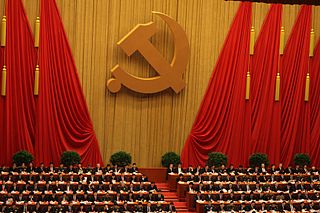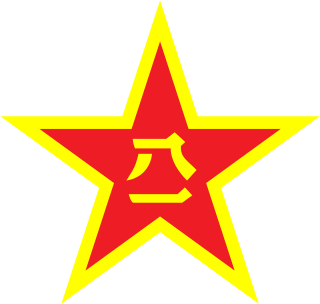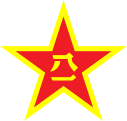
The Central Military Commission (CMC) is the highest national defense organization in the People's Republic of China, which heads the People's Liberation Army (PLA), the People's Armed Police (PAP), and the Militia of China.
Paramount leader is an informal term for the most important political figure in the People's Republic of China (PRC). The paramount leader typically controls the Chinese Communist Party (CCP) and the People's Liberation Army (PLA), often holding the titles of CCP General Secretary and Chairman of the Central Military Commission (CMC). The state representative (president) or head of government (premier) are not necessarily paramount leader—under China's party-state system, CCP roles are politically more important than state titles.

The Foreign Affairs Commission of the Central Committee of the Chinese Communist Party, commonly called the Central Foreign Affairs Commission, is a commission of the Central Committee of the Chinese Communist Party (CCP) that exercises general oversight on matters related to foreign affairs.

The government of the People's Republic of China is based on a system of people's congress within the parameters of a unitary communist state, in which the ruling Chinese Communist Party (CCP) enacts its policies through people's congresses. This system is based on the principle of unified state power, in which the legislature, the National People's Congress (NPC), is constitutionally enshrined as "the highest state organ of power." As China's political system has no separation of powers, there is only one branch of government which is represented by the legislature. The CCP through the NPC enacts unified leadership, which requires that all state organs, from the Supreme People's Court to the President of the People's Republic of China, are elected by, answerable to, and have no separate powers than those granted to them by the NPC. By law, all elections at all levels must adhere to the leadership of the CCP. The CCP controls appointments in all state bodies through a two-thirds majority in the NPC. The remaining seats are held by nominally independent delegates and eight minor political parties, which are non-oppositional and support the CCP. All government bodies and state-owned enterprises have internal CCP committees that lead the decision-making in these institutions.

The National Audit Office of the People's Republic of China is the supreme audit institution in the People's Republic of China. It was established in 1983 according to the Constitution. It is a cabinet-level executive department of the State Council and under the leadership of the premier.

The Xi Jinping–Li Keqiang Administration is the administration of China from 2013 to 2023. Xi Jinping and Li Keqiang succeeded Hu Jintao and Wen Jiabao after the 12th National People's Congress.

The National Security Commission is a commission of the Central Committee of the Chinese Communist Party (CCP) responsible for national security work and coordination.

A far-reaching anti-corruption campaign began in China following the conclusion of the 18th National Congress of the Chinese Communist Party (CCP) in 2012. The campaign, carried out under the aegis of Xi Jinping, General Secretary of the Chinese Communist Party, was the largest organized anti-corruption effort in the history of CCP rule in China.

The President of the People's Republic of China, commonly called the President of China, is the state representative of the People's Republic of China, which on its own is a ceremonial office and has no real power in China's political system. However, since 1993, the post has been held by the general secretary of the Chinese Communist Party (CCP) and chairman of the Central Military Commission, who is China's de facto leader.
Liu Zhanqi is a former officer of the Chinese People's Armed Police. He was investigated by the Commission for Discipline Inspection of the Central Military Commission (CMCCDI) in November 2014 and his case was handed over to military prosecutors in May 2015. Previously he served as chief of the People's Armed Police traffic command.

The Joint Staff Department of the Central Military Commission (JSDCMC) is the command organ and the headquarters for the People's Liberation Army (PLA), superseding the former PLA General Staff Department (GSD). It was established on 11 January 2016, under the military reforms of Central Military Commission (CMC) chairman Xi Jinping.

The Political Work Department of the Central Military Commission is the chief political organ under the Central Military Commission (CMC). It was created in January 2016 following the military reforms under CMC chairman Xi Jinping. Its predecessor was the General Political Department of the People's Liberation Army.

The Logistic Support Department of the Central Military Commission is a department under the Central Military Commission of the People's Republic of China. It was founded on January 11, 2016, under Xi Jinping's military reforms. The department organize and lead the logistics construction as well as overseeing housing, supplies, hospitals, and barracks of the People's Liberation Army. Its first director was Gen. Zhao Keshi. The current director is Lt. Gen. Zhang Lin.

The Equipment Development Department of the Central Military Commission is the chief organ under the Central Military Commission of the People's Republic of China. It was founded on January 11, 2016, under Xi Jinping's military reforms. The department continues to oversee and improve military technology. Gen. Zhang Youxia served as the first director. The current director is Xu Xueqiang.

The Training and Administration Department of the Central Military Commission is the chief organ under the Central Military Commission of the People's Republic of China. It was founded on January 11, 2016, under Xi Jinping's military reforms. Its first and current director is Major General Li Huohui

The National Defense Mobilization Department of the Central Military Commission is the chief organ under the Central Military Commission of the People's Republic of China. It was founded on January 11, 2016, under Xi Jinping's military reforms. Its current director is Lt. Gen. Sheng Bin.

The Office for Strategic Planning of the Central Military Commission is the chief organ under the Central Military Commission of the People's Republic of China. It was founded on January 11, 2016, under Xi Jinping's military reforms.

The Office for Reform and Organizational Structure of the Central Military Commission is the chief organ under the Central Military Commission of the People's Republic of China. It was founded on January 11, 2016, under Xi Jinping's military reforms. Lt. Gen. Qin Shengxiang served as its first director.

The Office for International Military Cooperation of the Central Military Commission is the chief organ under the Central Military Commission of the People's Republic of China for coordinating the People's Liberation Army's relationships with foreign militaries. It grew out of the PLA's Foreign Affairs Office, founded in 1951. It was founded on January 11, 2016, under Xi Jinping's military reforms. Its first director was Rear Admiral Guan Youfei.

The Agency for Offices Administration of the Central Military Commission is the chief organ under the Central Military Commission of the People's Republic of China. It was founded on January 11, 2016, under Xi Jinping's military reforms.









